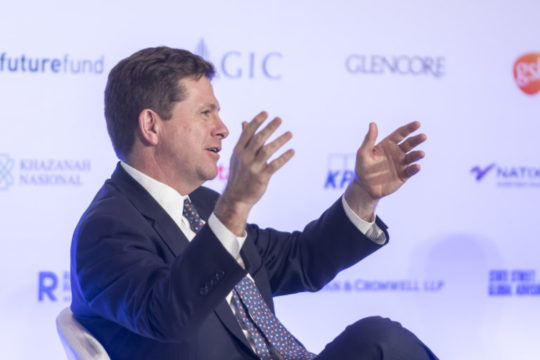FCLTGlobal is a 501(c)3 not-for-profit research organization whose mission is to rebalance capital markets to support a long-term, sustainable economy. Focusing Capital on the Long Term began in 2013 as an initiative of the CPP Investments McKinsey & Company, which together with BlackRock, Dow, and Tata Sons founded FCLTGlobal in July 2016. In addition to our Founders, today our 65 Member organizations span the investment value chain, including asset owners, asset managers and corporations, and are committed to accomplishing long-term tangible actions to lengthen the timeframe of capital allocation decisions.
The SEC is inviting public input on guidance as they apply to climate change disclosures “and whether and how they should be modified, can include comments on existing disclosure requirements in Regulation S-K and Regulation S-X, potential new Commission disclosure requirements, and potential new disclosure frameworks that the Commission might adopt or incorporate in its disclosure rules.” In addition to guidance, the SEC has also requested “empirical data and other information in support of their comments. Original data from respondents, including academics, data providers, and other organizations, may assist in assessing the materiality of climate-related disclosures, and the costs and benefits of different regulatory approaches to climate disclosure”.
Although FCLTGlobal’s responses do not directly address the 15 questions posed by SEC, we believe the following points include important considerations. Based on FCLTGlobal’s review of existing academic evidence, our own analysis, and research informed by our multi-year conversations with our Members and other experts, we suggest the SEC carefully consider the following points:
- Assets managed with a sustainability lens are on the rise, and companies and countries are focusing on climate-related risks and opportunities.
- Focusing on material sustainability adds long-term value.
- Standardization and leadership from the SEC are needed for progress.
Assets managed with a sustainability lens are on the rise, and companies and countries are focusing on climate-related risks and opportunities.
Assets have quadrupled in the past decade, with a 68% increase in the incorporation of ESG factors between 2014 and 2019. ESG and sustainability investing as an asset class is projected by Bloomberg Intelligence to be worth more than $53 trillion by 2025. In 2020, BlackRock forecasted that holdings for sustainable, exchange-traded funds and index funds will climb nearly sixfold to $1.2 trillion globally by 2030. Additionally, since green bonds debuted in 2007, the Climate Bonds Green Bond Database calculate the average annual growth rate at approximately 95%.
Organizations across the investment value chain have also made net-zero pledges by 2050 or sooner, including 253 members of the MSCI ACWI, 87 signatories of the Net Zero Asset Managers initiative (representing $37 trillion AUM), and 37 members of the UN’s Asset Owner Alliance (representing $5.7 trillion in AUM).
Finally, a 2021 study by Vivid Economics, showed that recent flows of stimulus capital across 17 major economies presents an opportunity for green investment to the tune of $3.5 trillion. In the US, the recent stimulus package had allocated close to $100 billion to specific funding for environmentally relevant sectors like transportation and agriculture. This meaningful flow of capital into climate-related investing warrants careful consideration from the SEC to ensure appropriate, robust disclosure and investor protections are in place.
Focusing on material sustainability adds long-term value.
Material sustainability reporting is vital to understanding a company’s long-term value creation story. As was demonstrated in work by Khan, Serafeim, and Yoon (2015) and by Grewal, Hauptmann, and Serafeim (2017), improvement on material sustainability metrics was linked to better company performance while disclosure of immaterial information was not informative.
A meta study from NYU’s Stern School of Business aggregated evidence from >1,000 studies published between 2015-2020 to evaluate the link between ESG and financial performance and found:
- Improved financial performance due to ESG becomes more marked over longer time horizons.
- Managing for a low carbon future improves financial performance.
- ESG disclosure on its own does not drive financial performance.
Finally, in FCLTGlobal’s piece ‘Predicting Long-Term Success’ we found that ESG controversies have an explanatory power of decreasing long-term value creation by 12%.
Standardization and leadership from the SEC are needed for progress.
Many governments, development banks, and non-government organizations (NGOs) have done extensive work on sustainability disclosure. The result has been that across the sustainability reporting field there exists a multitude of frameworks, with different definitions and metrics for measuring what is sustainable.
Companies faced with competing requests for disclosure must make their own decisions about which frameworks to adopt or opt to selectively disclose across several different frameworks. Clear regulatory guidance will provide a pathway to focus and limit disclosure to relevant metrics. Issuers typically disclose historical data; markets also consider non-issuer disclosed historical data as well as a variety of forecasts of future performance. Having companies be very clear on issuer-disclosed, historical data (as is the case with financial data) will both increase the robustness of that data and provide companies with a narrow list of requirements rather than today’s range of information demands on companies.
For long-term investors, ensuring their investment decisions consider factors that affect long-term value is critical for fulfilling their fiduciary duty. Having disclosure standards that provide comparable data will allow them to make informed judgments on such matters integral to optimizing their long-term portfolios.
The SEC can provide leadership to companies and investors by:
- Engaging with the global community on this issue, including pushing the G7 work forward.
- Engaging in the convergence around the IFRS Sustainability Standards Board which is focusing on building standards based on existing frameworks related to financially material metrics including: TCFD, the Value Reporting Foundation (SASB/IIRC merger), and the World Economic Forum.
- Recognizing that companies and investors are global, and while different jurisdictions may choose a shorter or longer list of metrics, it is critical that those metrics are calculated consistently globally – the “building blocks” approach.
Conclusion
We have learned from the experience of MIFIDII and GDPR that US companies and investors are strongly affected by European requirements. Having a global standard, with the US having a seat at the table in its creation, is the only way to avoid inadvertent rulemaking by others for US actors. While the US and other jurisdictions could choose a shorter or longer list of metrics and disclosures to require, having the same overall set of standards underlying their requirements will dramatically simplify reporting and improve comparability.
In conclusion, we believe that the SEC should be an active participant in the global standard-setting process underway, as evidenced by the G7 communique. By building on the work of the Value Reporting Foundation (SASB and IIRC), TCFD, and the WEF sustainability metrics work, the best choice for the US is to create a menu of global sustainability disclosure standards from which the US could select the most appropriate required disclosures.
We appreciate the opportunity to submit these remarks for consideration. Should anyone at the Commission have questions about the research or our remarks, we would welcome the prospect of further discussion.
Most Sincerely,
Sarah Williamson, CAIA, CFA
Chief Executive Officer
FCLTGlobal |
Ariel Babcock, CFA
Managing Director, Head of Research
FCLTGlobal |
 Download full letter
Download full letter


